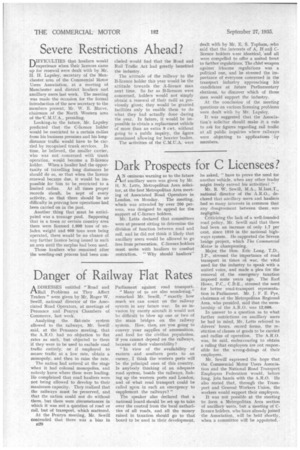Severe Restrictions Ahead?
Page 30

If you've noticed an error in this article please click here to report it so we can fix it.
DIFFICULTIES that hauliers would experience when their licences came up for renewal were dealt with by Mr. H. H. Lapsley, secretary of the Manchester area of the Commercial Motor Users Association, at a meeting of Manchester and district hauliers and ancillary users last week. The meeting was made the occasion for the formal introduction of the new secretary to the members present, Mr. W. E. Macve, chairman of the North Western area of the =IC .M.1U.A. , presiding.
Looking-to the future, Mr. Lapsley predicted that the C-licence holder would be restricted to a certain radius from his business premises and his longdistance traffic would have to be carried by recognized trunk services. In time, he believed, the smaller carrier, who was not concerned with trunk operation, would become a Bdicence holder. When a haulier had the opportunity of travelling long distances he should do so, so that when the licence renewal became due, it would be impossible for him to be, restricted to a limited radius, At all times proper records shoulL be kept of every activity, so that there should be no difficulty in proving how operations had been carried on in the past.
Another thing that must be anticipated was a tonnage pool. Supposing that in a town or certain country area there Were licensed 1,000 tons of unladen, weight and 900 tons were being operated, there would he no chance of any further licence being issued in such an area until the surplus had been used.
Those hauliers who remained after the weeding-out process had been con eluded would find that the Road and Rail Traffic Act had greatly benefited the industry.
The attitude of the railway to the Bdicence holder this year would be the attitude towards the A-licence man .next time. So far as Bdicences were concerned, holders would not simply obtain a renewal of their radii as previously given; they would be granted facilities only to enable them to do what they had actually done during the year. In future, it would be impossible to obtain a replacement vehicle of more than an extra 9 cwt. without going to a public inquiry, the figure mentioned allowing for heavier bodies.
The activities of the C.M.U.A. were
dealt with by Mr. E. S. Topham, who said that the interests of A, and Clicence holders were identical, and all were compelled to offer a united front to further regulations. The chief weapon against irksome regulations was a political one, and he stressed the importance of everyone concerned in the transport industry approaching his candidates at future Parliamentary elections, to discover which of those men would support the industry.
At the conclusion of the meeting questions on various licensing problems were dealt with by Mr. Lapsley.
It was suggested that the Association's solicitor should make it a rule, to ask for figures regarding rail traffic at all public inquiries where railways were objecting to applications by members.




















































































